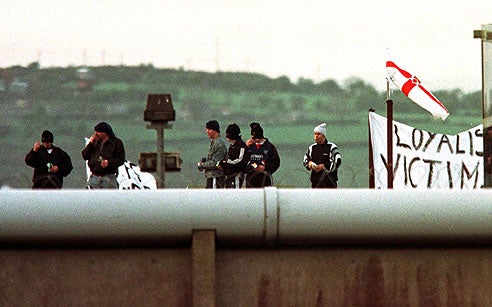Maze prison was as bad as Guantanamo, say producers

Your support helps us to tell the story
From reproductive rights to climate change to Big Tech, The Independent is on the ground when the story is developing. Whether it's investigating the financials of Elon Musk's pro-Trump PAC or producing our latest documentary, 'The A Word', which shines a light on the American women fighting for reproductive rights, we know how important it is to parse out the facts from the messaging.
At such a critical moment in US history, we need reporters on the ground. Your donation allows us to keep sending journalists to speak to both sides of the story.
The Independent is trusted by Americans across the entire political spectrum. And unlike many other quality news outlets, we choose not to lock Americans out of our reporting and analysis with paywalls. We believe quality journalism should be available to everyone, paid for by those who can afford it.
Your support makes all the difference.A film documenting the final weeks of the IRA gunman Bobby Sands has been defended by its makers at the Cannes Film Festival as a useful insight into the mindset of modern suicide bombers.
Hunger, a 96-minute film by the artist Steve McQueen, in competition at Cannes and part-funded by Film4, tells the story of Sands who died on hunger strike at the Maze prison; some critics say it is creating a hero out of a terrorist.
But Jan Younghusband, the executive producer of the film and commissioning editor of arts at Channel 4, said the harrowing story merely exposed the mentality of someone ready to die for a cause, such as the London suicide bombers. "You look at suicide bombers and wonder what it is that drives them to kill themselves in their attempt to make the world better," she said.
"This is a very contemporary issue, destroying your body for something you believe in. We look at terrorists and we think, 'Aren't they horrible; they are blowing us up'. But we have to ask what is our role in that? We are not without responsibility."
Using only sparse dialogue and including violent scenes of IRA prisoners being beaten, the film's writer, Enda Walsh, spent weeks interviewing Sands' fellow prisoners and guards. The makers say the story draws a parallel between IRA prisoners in the Maze and those in Iraq's Abu Ghraib and the US-run detention camp, Guantanamo Bay.
Ms Younghusband added: "We think it is an awful situation in Guantanamo but we had exactly the same situation here. Let's remember we were doing this before Guantanamo. The film asks so many questions, including, 'What is the point of this kind of incarceration?'."
The drama, the directorial debut for McQueen, the Turner Prize-winner, focuses on the last six weeks of Sands' life. Jailed for possessing a gun, he died in 1981 at 27 after 66 days on hunger strike, a protest at prisoners losing their political status.
Sands was elected as a Member of Parliament 25 days before he died; his death prompted days of riots in nationalist areas of Northern Ireland and drew 100,000 to his funeral. Some believe the film is likely to rekindle bitter feelings. Sands' family was invited to see the film but declined a personal screening.
McQueen said: "The film, for me, has contemporary resonance. The body as site of political warfare is becoming a more familiar phenomenon. It is the final act of desperation; your own body is your last resource for protest."
Click here for the latest pictures from the Cannes Film Festival
Join our commenting forum
Join thought-provoking conversations, follow other Independent readers and see their replies
Comments